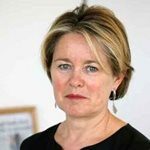
Anne Spackman
Independent member on the Standards and Regulation board of the Royal Institution for Chartered Surveyors; non-executive director of Profusion, a data science business. She is also a trustee of three charities in the social mobility and education space – the Greenshaw Learning Multi-Academy Trust, Royal Springboard and Prime Commitment.
You can listen to Anne’s story in full on podcast here or search ‘Women on Boards Success Stories’ in all major apps:
Unpicking your boardroom value-add
What can a journalist bring to the boardroom? This is the question Anne Spackman found herself facing when seeking to build a NED portfolio.
Her career as a journalist had culminated in an assistant editorship and Executive Directorship at Times Newspapers, which she followed with a stint as CEO of the charity, Career Ready – a successful, interesting career by any standards. Yet her fit for NED roles wasn’t obvious – after all, editorial and management skills are on few, if any, NED role specifications.
“When I first looked through Women on Boards Vacancy Board, my thought was that I had no idea there were so many roles I was completely unqualified to do,” Anne says. “It was hard to work out where I could fit in.”
Fast forward just 18 months and Anne has clearly found her place in the non-executive world with five roles. She is an iNED at a growing business, a member of the Regulation and Standards Board at RICS and trustee of three charities including a multi-academy trust.
The ‘game changer’ as Anne puts it was attending the Women on Boards CV Masterclass. “Without Women on Boards, I wouldn’t be where I am today,” Anne is clear. In part, she found immense reassurance at the Masterclass in being surrounded by other highly accomplished women who are not finding non-executive roles a straight-forward fit. But more, the session showed her how to unpick what she had done in her roles and relate it to what recruiters are looking for.
For example, her editorship at The Times meant she was adept at ‘spotting the gaps’ in information presented and as a journalist knew how to ‘ask good questions’. These are both critical elements of being a non-executive. An editor must also start from the reader’s perspective – a skill which Anne transfers easily to bringing the public or customer view into the boardroom as an iNED.
The masterclass also highlighted the boardroom value of personal qualities which Anne would not otherwise have mentioned. “I have ‘strong sense of fairness’ and ‘integrity’ on my CV,” she explains. “This is key on boards.” She cautions that, as in journalism, it is important that what you describe is not “a candy floss of abstract nouns with nothing to get your teeth into, but specific achievements and characteristics.” Anne has numerous examples from her career of choosing ethics over commercial advantage to demonstrate the integrity she brings.
Anne also realised the relevance of having chaired a charity board in her 30s. In fact, a headhunter advised her this was key in putting her forward for the Chair of a housing association. “I was surprised even to be shortlisted,” Anne said, although she was ultimately not appointed due to her performance at interview.
“I belatedly realised I’d only been interviewed once in the previous 25 years, so went and got some practice with a headhunter.”
Being in the boardroom has very quickly deepened Anne’s understanding of what she brings. She admits she would not have put herself forward for the role at Profusion, a data science business, if she hadn’t been approached by the CEO who was in her network. The initial focus was on her value in creating an academy to help young people develop data skills – an obvious fit with her work at Career Ready. However, once there Anne has found she can make a far wider contribution. “Running a charity and a small business are exactly the same thing,” Anne says, “I’ve been that overworked CEO, so I know how to be useful and support her decision-making.”
Perhaps the hardest role to see Anne’s fit with is the Standards and Regulation committee at RICS – though she had been a property editor for several years. After all, many might assume experience in areas like audit or regulatory compliance would be required. “It’s only once you’re into the detail of the application that you realise how relevant your experience is to what they need,” Anne says. For example, as a Managing Editor she was responsible for developing and ensuring compliance with regulation around advertorials; RICS was also seeking to improve standards around diversity in the industry, something Anne dealt with constantly at Career Ready.
It’s clear even a few months into these roles that Anne will have more and different attributes to showcase in her Board CV when she next looks for a non-executive role. As she puts it, ‘your Board CV is a malleable beast, keep developing it over time’.
Anne doesn’t plan on updating her Board CV in the short term, however, with a busy portfolio of roles across a spread of sectors. “I decided not to target the FTSE type boards,” Anne reflects, “I don’t think I have the right skill set or interest, even if I were to be successful.” We wonder how things will look after a couple of years developing her Board CV …
